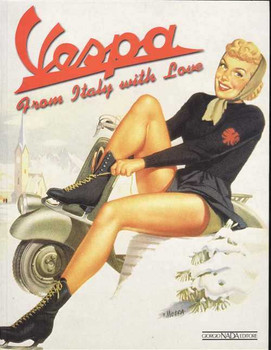Description
By: Giorgio Sarti . ENGLISH EDITION
In April 1946, the first 15 Vespas came off the Piaggio production line. That was the debut of the revolutionary little two-wheel vehicle, which, as well as leaving an indelible mark on the history of transport, became a real cultural phenomenon to successive generations. Simple and elegant, practical and comfortable, these are some of the characteristics that have ensured the popular scooter an unrepeatable success, with 35,000 of them built in 1949 alone. Sixty years after its birth, the Vespa, of which 17 million have been produced, has affirmed itself throughout the world. To celebrate this historic anniversary, a book has been published that covers the fascinating epic of the Vespa, from its debut to the present day, through hundreds of pictures and invaluable documents of its various epochs. The work is introduced by Roberto Colaninno, the current president of Piaggio, and includes a systematic cataloguing of all the models that have appeared in those 60 years, each one accompanied by a detailed technical specification.
Every one of the models produced during the first 60 years is fully illustrated, including the variants introduced during their development. Each model is described in detail, with the most significant features highlighted to facilitate their recognition, while a technical file with over 30 headings provides comprehensive factual information. In order to provide a cleaner and more immediate overview of the various series, the production catalogue has been subdivided into decades, within which the models appear in increasing order of displacement. The review is completed by the various models built under licence abroad. For the first time, readers are offered a broad, decade-by-decade overview of both the technical and stylistic development of the Vespa and the historical context in which it existed (and continues to exist). The book is enriched by and introductory section examining the historical background to the birth of the Vespa, with the various prototypes and the most important figures involved in its development. Naturally, there is also an ample section devoted to communication: both advertising and the famous calendars that contributed to the creation of the Vespa legend, the most important examples of which are illustrated here. The Vespa has also figured in the worlds of art, film and music, something that is naturally dealt with in this book. Further pages are devoted to important events in which the Vespa has played a leading role: from the creation of the Vespa clubs (in Italy and abroad) to the great rallies, from racing to record breaking, from gymkhanas to raids. The book is completed by the other vehicles closely related to the Vespa such as the three-wheeled Ape and the less well-known Moscone outboard engine and the Vespa 400 small car. The concluding chapter takes the form of and invitation to visit the Piaggio Museum at the Pontedera factory and explore the wealth of historical material it contains. A unique reference work of great appeal and interest to all those enthusiasts who have contributed to the Vespa's success with over 17 million examples being sold over the last 60 years.



















